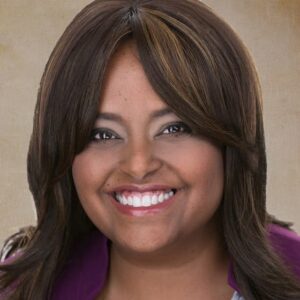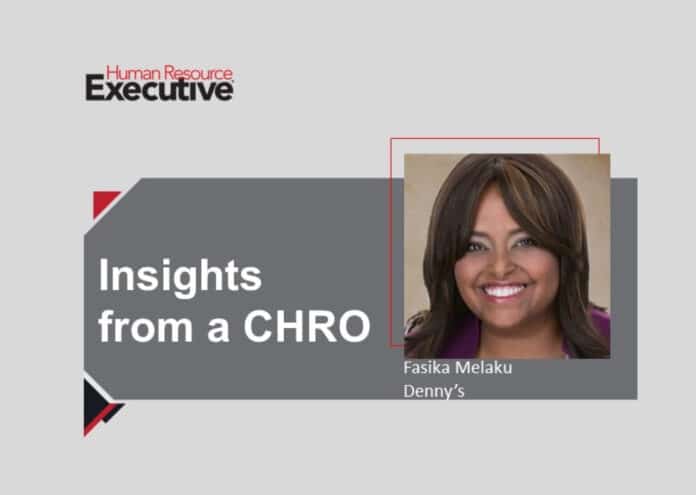Fasika Melaku knows what it feels like to be an outsider facing obstacles.
She immigrated to the U.S. in her teens from Ethiopia, was adopted, has survived cancer and became a mother in her late 40s. All of those experiences, she says, have helped her infuse empathy into her HR work, including in her current role as vice president of HR and chief learning officer at Denny’s. Her background especially solidified a commitment to investing in the potential of every employee—a focus at the heart of the new educational attainment program at “America’s Diner.”
This summer, Denny’s rolled out GAIN, a comprehensive career development initiative available to its 3,400 employees worldwide. Through the program, workers can attain their GED, get college credit for learning initiatives, develop life skills and build career pathways within the organization.
“It’s a complete, whole-employee approach to development,” she says.
Melaku—who has been with Denny’s for seven years and previously held HR and L&D leadership positions at Taco Bueno and Brinker International—says Denny’s foresees positive reverberations from GAIN on DE&I, recruitment, retention and the overall bottom line.
“We believe there’s a tremendous echo effect,” she says. “When you open the door for attainment for each individual—however they define attainment—we will have engaged, satisfied team members, and they will then improve guest satisfaction like no other program can.”
Melaku recently shared more about her goals for GAIN and her own development.
HRE: What was the impetus of the GAIN program? Why now?

Melaku: When we were thinking about the opportunity to help the communities that power Denny’s and everything everyone has been through with the pandemic, we wanted to create a space where people can grow, across multiple levels—and we believe Denny’s is that place.
Denny’s is America’s diner—for America today. And if that’s true, how can we be purposefully supporting the teams that power our brand? That’s what GAIN is all about. It’s about how we are meeting our purpose: feeding the body, mind and soul—for our guests and our workforce.
HRE: What has the response from employees been like so far?
Melaku: Oh wow. I have never seen a program that has touched the lives of so many people, including the people who are designing it. GAIN is about opening doors where doors weren’t, giving opportunities for our everyday workforce to reach attainment, to reach that level of security—whether that’s career attainment, financial attainment, just being seen.
We talk a lot about the paper ceiling—whether that’s a high school diploma or a college diploma—and GAIN is about just providing that access to education. We have over 150 people going after their GED already, and we just launched. That’s huge, huge. So, we’re excited about the progress we’re seeing, we’re excited for our team members, and we have managers and owners already telling us what this is doing for our brand.
HRE: How does this program feed into overarching diversity, equity and inclusion strategies at Denny’s?
Melaku: It goes back to our purpose of feeding the mind, body and soul—we do that for everybody, including underserved communities. It’s about making sure that access to attainment is there. That’s what we’ve been doing with our Hungry for Education scholarships, with our work with HBCUs, our work supporting efforts around DE&I in the communities we serve. We thought it was time to do that very same work for the people we employ because they are the very same people who need that access.
Everyone doesn’t have the same access. I had different doors open than others did. I was adopted, and that opened a door for me that others may not have had. We have 1,600 Denny’s locations, and we are global—every door at Denny’s could open up a career path. That’s why we see GAIN as a supportive and functioning sister to the DE&I work we’re doing.
HRE: For organizations looking to invest more in employee development, what are some of the key HR lessons learned as Denny’s got GAIN off the ground?
Melaku: I think everyone in every HR suite or L&D room should be looking for stories—opportunities to capture the hearts and minds of their teams. And when you do, you can open the door to power your brand, to power innovation. And that’s going to come back to having one-on-one conversations to understand what may be impeding your teams.
I’ll give you an example: There’s a gentleman who works for us, and he runs a $24 million portfolio—but what’s been a blocker for him is that he doesn’t have his GED. We never knew that. Sometimes, we look for a beautiful story outside and it’s sitting right here for us. So, now he’s getting his GED and he has the opportunity to further his career with college credits through the learning he’s doing today and has done at Denny’s.
HRE: Beyond investing in development, on what other fronts have Denny’s been tackling retention, particularly since the start of the pandemic?
Melaku: We kicked off by making sure our teams could work where they felt comfortable, particularly if it was something they could do at home. We believe that the opportunity to individually talk to each person and ensure they were comfortable doing the good work they needed to was critical. Second was really about designing holistic support for the individual, and our new CEO doubled down on this focus on wellbeing and mental health.
We have since had a mental health summit and gone through an immersive 30-day experience to focus on resilience and how to have a thriving environment—not only at work but at home. Today, we’re focused on the entire being and that’s huge.
We also introduced a “grow model.” It’s about saying, “How do you want to grow as a person? And how do we help?” It’s these items that have helped us keep the retention we have today and even win some of the awards we’re winning, like with [being named to] Newsweek’s Most Loved.
See also: HR’s biggest post-COVID hiring challenge? The ‘widening’ skills gap
HRE: Learning and development have been key throughout a number of your HR roles. How do you focus on your own learning and development?
I have a fundamental belief that every day is an opportunity—every minute of every day. We have a mantra at Denny’s: We’re focused on learning but to learn, you have to unlearn first.
For me, when I’m sitting down and talking to someone on the team or I walk into the restaurant and am going to take direction from the server or host, I know that anyone I meet gives me a learning experience. What do I need to rethink in my own mindset to help me open up to what I’m about to learn? That’s how I try to approach every day, with an open mind and being very direct about how I’m ensuring I’m always growing.
HRE: What factors outside work most influence how you approach HR?
Melaku: When I think about the role I have today and how I support our teams, our people and the performance of our brand, I think of two things that shape me. One is the experience—and this sounds weird but—of coming to America. I’m from Ethiopia and I came here in high school. I always felt a little different, knowing I had a different language, I had a British accent. Having that feeling helped me understand truly what it means to be seen. We all say that but unless you have that opportunity to really experience it on the other side, it can be tough to actually understand.
The second came more recently: I have a 3-year-old. I am a cancer survivor and was told I’ll never have kids—and I believed them. But I will say this: Don’t believe everything people say to you. You can take an idea—whether that’s wanting to be a mom or taking your experience to a new level—and someone else can take that idea away or put time restraints on it, and there shouldn’t be restraints. Today, I now have a 3-year-old—little Jackson—and I’m 50. And that experience has shaped how I look at my work.



